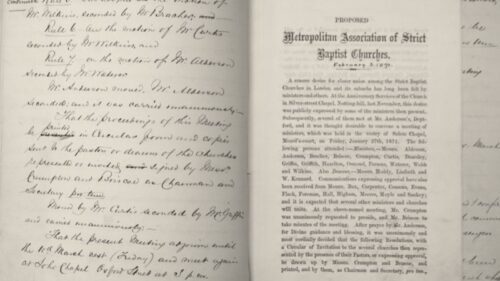-
Thoughts On Closed Communion
Is the Communion Table open or closed? Since all Christians recognize the Communion Table is restricted to professing believers, at the exclusion of all unbelievers, it is safe to say that there is no such thing as a purely open Table. And, since all discerning Baptists recognize the Communion Table is restricted to professing Christians that have been baptized, at the exclusion of all other Christians, it is safe to say that there is no such thing as a purely open Table among Baptist churches. It therefore reeks of hypocrisy when the ‘Open Communionists’ accuse their brethren who subscribe to a restricted Table as being uncharitable, unkind, judgmental and legalistic. Unlike the open Communion Baptists who recognize only two restrictions on the Table (regeneration and…
-
14. The Lord’s Supper
John Gadsby—The following meager scraps are all I have been able to meet with as to my father's observance of the Lord's Supper. If there were any one part of the services of God's house in which he was more solemn and impressive than another, it was at this ordinance, and every time, month after month and year after year, he was always favoured with something new to lay before the people. On leaving the vestry and reaching the table, he first gave out a suitable hymn, which was sung. He then, if any persons were to be received into the church, they having previously taken their seats in the tablepew, he requested them to stand up; and he then frequently addressed them collectively after…
-
The Historic Affirmations
The Affirmations set forth in the following statements are representative views of the historic values maintained by Strict (restricted table) and Particular (restricted atonement) Baptist churches, before and up to the mid-twentieth century. Since the Second World War, most historic churches have (1) adopted the Westcott and Hort text, thereby departing from the high view of verbal inspiration; (2) adopted the teachings of Fullerism, thereby departing from the high view of Sovereign Grace; (3) adopted the philosophy of Ecumenism, thereby departing from the high view of strict communion; (4) adopted an adaptation of Presbyterianism, thereby departing from the high view of Baptist polity. It appears many Strict Baptists have failed to understand that moving with the times does not mean churches must move from the…
-
Strict Communion
-
Chapter 2: The Significance of Baptism
The advent of John the Baptist into the world was not an unexpected event. Although his birth had not been announced by angels, as was Christ's, yet God had declared, "I will send my messenger and he shall prepare the way before me."—Mai. 3:1. "Behold, I will send you Elijah the prophet before the coming of the great and dreadful day of the Lord: and he shall turn the heart of the fathers to the children, and the children to their fathers, lest I come and smite the earth with a curse."—Mai.4:5,6. Jesus declared that it was John of whom this was written. —Matt. 11:10. He also testified that Elias (Elijah) must first come, but declared that he had already come, and they knew him…
-
Chapter 3: The Definition Of The Church
Before proceeding further it will be necessary to examine into the meaning of the word "church." This word has come to be used in such a broad sense that it takes in and is applied to any religious organization, or society, whether a Scriptural church or not. By some writers it is made to "include the entire body of professed Christians." By others it means "the spiritual congregation, or aggregate of the regenerate, including the saints in heaven, the saints on earth and the saints yet to come." The general usage of the word at present justifies both of these definitions, but its Scriptural use does not, nor was the word so used in the time of Christ and his apostles. In fact the word…









